
Editor’s note:
China.org.cn presents you with live coverage of the press conference held by Chinese Premier Li Keqiang on March 16, 2016, immediately after this year’s NPC session concluded.
Please stay tuned for our live updates on this event.
————————————————–
All time is Beijing Time (GMT+0800).
[12:43] That’s it for the live blog. Thanks for following along with us.
[12:40] Premier Li Keqiang: We have attached great importance to the issues concerning agriculture, the countryside and villagers. We will also give high priority to guaranteeing the legitimate rights of our workers. Our time is limited. I’m afraid I can’t answer all of your questions. See you next year.
[12:39] Premier Li Keqiang: The prices of agricultural products in China, especially grain prices, are much higher than prices in the international market, especially with corn, wheat and rice. The average price in China is about 600 yuan per ton higher than international price. That is mainly because our labor productivity is still quite low. In the future, we are going to pursue a coordinated development between new type urbanization and agricultural modernization. We will help bring more rural people to urban areas, and for those who are already working and living in urban areas, they will be granted urban residency if they meet certain eligibility requirements. That’s also one of the ways to boost their income. We will also develop various forms of appropriately scaled farming to boost our agricultural labor productivity and enhance the competitiveness of our agricultural products. The central government will continue to support the development of agriculture and enhance the wellbeing of Chinese farmers.
[12:36] 17. Farmers’ Daily: Last September, when we were about to harvest corn, the central government introduced an adjusted price for the purchase and storage of corn and the price was cut by 20 percent which brought huge losses to corn growers. We know that this is also part of the supply-side reform to adjust agricultural structure, but I want to ask the Premier, what steps will the central government take with respect to the price of grains in China?
[12:34] Premier Li Keqiang: Of course, there is still room for adjustment in the social security package and the housing fund. As I mentioned just now, we have ample social security funds, and we will allow autonomy for local governments, who will carry out their own plans to lower the payment ratio within a unified national framework. Our main goal is to lessen the employer’s burden while putting more money into the pocket of the employee. Thank you.
[12:33] Premier Li Keqiang: Your question is quite detailed. Perhaps many Chinese journalists present today have experienced the situation you’ve described. While I was attending the “Two Sessions,” some NPC deputies and CPPCC members also said that we could consider properly adjusting the payment ratio for the social security package and the housing fund. The CPC Central Committee and the State Council have both attached great importance to this matter. Last year, the State Council already lowered the payment ratio for the insurances to cover workplace injuries, unemployment, and maternity insurance.
[12:31] 16. CCTV: Thank you, Mr. Speaker, for giving me this final opportunity. Mr. Premier, my questions concern the five different insurances in the social security package and the housing provident fund. There is an urge in society to lower the ratio of payment of the social insurances and housing fund, because the contribution to the social security plan would result in a heavy burden both for the person in the insurance plan and his employer. Both the employer and the employee wish to reduce their payment. But looking at it from another perspective, if both parties reduce their contributions, then would we have enough funds for the already tight social insurance fund? Mr. Premier, what is your response to these social concerns? Are these issues already in your work agenda? Thank you.
[12:30] Premier Li Keqiang: The recent match between AlphaGo and the South Korean Go champion has become a hot topic in the three countries. I think it shows that we share something in common with respect to culture. Win or lose, AlphaGo was designed and made by humans. China, South Korea, and Japan, or China and Japan, should be able to jointly promote smart manufacturing and develop higher quality products that can better meet consumers’ needs. The economies of the three countries account for one fifth of the world total, and 70 percent of the Asian total. I believe there are many complementarities among us and that if we can leverage these complementarities we can do even better in the global market.
[12:28] Premier Li Keqiang: It is up to the interactions between the three sides for the trilateral meeting to go smoothly, particularly between China and Japan. There have been some improvements in the relationship between China and Japan, but it is still fragile. I believe it is important to adhere to bilateral consensus involving historical issues and to match one’s words with concrete actions. And I don’t want to see the bilateral relationship to retrograde.
[12:27] 15. Nihon Keizai Shimbun of Japan: Japan will host this year’s trilateral meeting between the leaders of China, Japan, and South Korea. What are your expectations for the meeting? Some experts believe that Japanese companies can play a big role in helping China transform its economy. What do you think of the economic complementarity between China and Japan?
[12:26] Premier Li Keqiang: The purpose of making governmental affairs public is to put the government’s power under public supervision. This will improve government efficiency and prevent the government from abusing its power. Supervision from the public and the media is welcomed.
[12:25] Premier Li Keqiang: Third, we need a timely response to social concerns. Our policies are made to benefit the people. When some of the policies confuse people, we have to offer an explanation. When we receive good suggestions, we should revise the policies accordingly. We must make our policies understood by all, and we must respond to social concerns. Before the opening of the “Two Sessions,” I asked all ministers to actively and directly answer media questions. I heard that the reporters were satisfied with their performances this year.
[12:24] Premier Li Keqiang: Second, we must upload as much information as possible onto the internet. We need to release the government list of powers, too. This will help to narrow the space of arbitrary use of power.
[12:23] Premier Li Keqiang: To increase transparency of governmental affairs and streamline administration are both essential for transforming government functions. First, any information that can be made public should be released. So openness shall be a standard practice. More information needs to be made public if it concerns issues that involve public interests. We should make the government information accessible to the public as easily as just one click away.
[12:22] 14. CNR: People are now looking forward to seeing more transparency in governmental affairs. But some local governments and departments lag behind in releasing information. People are not happy about it. What is your opinion?
[12:21] Premier Li Keqiang: We will continuously introduce measures to promote economic cooperation between the two sides so as to ensure a peaceful development of the cross-strait relations based on the 1992 Consensus. As long as we abide by the political basis and hold strong in the belief that we belong to one China, everything can be negotiated. I am personally optimistic regarding the prospect of the peaceful development of cross-strait relations. We are as inseparable as flesh is to blood. I believe that the economic and trade development between both sides will both benefit and improve the people’s livelihood. Thank you.
[12:18] Premier Li Keqiang: The peaceful development of cross-strait relations has benefitted the people of both sides of the Taiwan Strait. The economic and social ties between the two sides have become closer and require greater interaction. Last year, I paid a visit to Fujian Province and had a roundtable discussion with businessmen from Taiwan, who were very sensitive to economic measures from the mainland. Some were concerned whether or not the preferential policies will change. After coming back, we quickly released a document ensuring that the mainland’s preferential measures towards Taiwanese businesses will remain unchanged. We need to reassure them. Why? We are all members of the same family.
[12:11] 13. CtiTV.com from Taiwan: There was a change in the ruling party of Taiwan this year. A few people have commented that this will bring about uncertainties in cross-strait relations. What do you think about the prospects of cross-strait relations? Will the mainland release new measures to boost cross-strait economic cooperation and improve the people’s livelihood?
[12:10] Premier Li Keqiang: The government is determined to accelerate the construction of a national network of medical insurance. This year, we will basically solve the direct settlement of medical expenses that occurs in a different place within a province. Within two years, we will try to achieve inter-provincial settlement of expenses concerning the hospitalization of elderly people so that site-off settlement of logical, reasonable expenses will no longer be a problem. However, this requires massive efforts from all the concerned departments. Improving people’s livelihood is the purpose of our governance and people’s appeals concerning livelihood will propel the country to develop, and push forward and test its reforms. Thank you.
[12:07] Premier Li Keqiang: I will thank you first for conducting an online survey to better understand the difficulties associated with the people’s livelihood. Asking questions to the government will help it improve its work. I also frequently hear about the thing you mentioned. Some elderly people, after retiring, live with their children in a different city, and help look after their grandchildren. But when they are sick or even hospitalized, they have to go back to the place where they worked to claim medical reimbursement. This may sound too concrete a question, but it matters a lot for any family encountering the problem.
[12:06] 12. China Daily: Ahead of the “Two Sessions,” China Daily has conducted an online survey entitled, “I have a question for the premier.” We have picked out the ten questions most concerned about by the public and they are all closely related to the people’s livelihood. On top of the list is accelerating the construction of a national network of medical insurance. Those people who have voted for the question may be watching this live broadcast now. Do you have a timetable for solving the issue? Thank you.
[12:05] Premier Li Keqiang: As for the turnaround in economic cooperation, let me share an example with you. Last year, our oil imports from Russia increased by more than 8 million tons. Unfortunately, the world’s commodity prices fell. Our total imports and exports shrank, and there was no exception in the case of Russia. Although the number saw no decrease, the trade volume fell. Both parties were not responsible for that. At the end of last year, the Russian Prime Minister Dmitry Medvedev and I held in-depth discussions about the integrated operations in the oil and gas industry, which would attract more Chinese investment to Russia. Additionally, we can explore more trade channels and realize trade diversity. I hope you can attend this press conference next year, and that, at that time, I will be able to tell you that the Sino-Russian trade and investment trends have moved in a better direction. By the way, our better business trends reflect a turnaround in world trade.
[12:04] Premier Li Keqiang: We will continue to develop the Sino-Russian relationship. Of course, we say no to an alliance, and our cooperation will not target any third party.
[12:01] Premier Li Keqiang: China and Russia are each other’s largest neighbor, and enjoy a comprehensive strategic partnership of coordination. The Sino-Russian relationship is comprehensive. President Xi Jinping and President Putin have regular meetings. We have not only seen sound political ties, but also a turnaround in economic cooperation. We have a variety of cooperative projects in different fields. China has always enjoyed a relationship with Russia on the basis of mutual respect and win-win results. China follows an independent foreign policy of peace. The Sino-Russian relationship will not be influenced by the changing international situation, or put under pressure by any third party.
[11:57] 11. Russia Today: Both China and Russia once said that the two countries’ economic cooperation has lagged behind their political development. The two countries promised to improve the situation by promoting trade ties and strongly pushing ahead with investment cooperation. However, we haven’t seen a large inflow of Chinese investors. Why? Is it related to the sanctions that western countries have imposed on Russia, or relevant to the Russian economy? Have Chinese companies faced pressure from the U.S. during their cooperation with Russia? Additionally, some experts believe that China is not interested in investing in Russia, but only interested in getting cheap energy from Russia. What’s your opinion regarding this viewpoint? Thank you.
[11:55] Premier Li Keqiang: New growth drivers will also help with our efforts to cut industrial overcapacity. The companies with overcapacity have problems with overstaffing, and the growth of new drivers will help generate new jobs. The campaign of mass entrepreneurship and innovation is aimed at providing a platform for various types of companies and research institutions, and to create a broad space for crowd founding, crowd innovation and crowd sourcing.
[11:51] Premier Li Keqiang: When development has come to a certain stage, it is natural for traditional growth drivers to begin to weaken, which is what has happened in many developed countries. As a result, we need the benefit of new growth drivers to accommodate the needs of the industrial revolution. When we combine the new growth drivers with the traditional growth drivers, we can create a hybrid driving force.
[11:50] Premier Li Keqiang: The “new economy” refers to fostering new growth drivers and encouraging China’s economic transformation. The concept of the “new economy” covers a wide range of areas. It can be found in primary, secondary and tertiary industries. It is not only the emerging forms of business including e-commerce, cloud computing and the Internet of things. It can also be found in smart manufacturing and large scale customized production in the industrial sector. It is also included in family farms and share-holding cooperatives. We believe that micro and small businesses can do a lot in developing the “new economy” while large companies can also make a big difference. Many of them have established their own maker spaces.
[11:47] 10. Caijing: In this year’s government report, for the first time, the concept of the “new economy” was introduced. Does this concept refer to the e-commerce aspect of both micro and small businesses? What does it have to do with the campaign for mass entrepreneurship and innovation? How helpful could it be for withstanding downward economic pressure?
[11:46] Premier Li Keqiang: The development of Hong Kong is necessary for the region itself and the country as a whole. Hong Kong should rely on itself to promote development. As a developed economy, Hong Kong achieved 2.4 percent economic growth in 2015. This is not low. Hong Kong should make better use of its strengths and seize the opportunities brought about by the mainland’s development. The central government will spare no effort in supporting the Hong Kong government by promoting Hong Kong’s long-term prosperity and stability and by improving the lives of Hong Kong people. I’m confident in Hong Kong’s future.
[11:45] Premier Li Keqiang: Hong Kong will maintain long-term stability and prosperity. The principles of “one country, two systems”, “the people of Hong Kong governing Hong Kong” and a high degree of autonomy have not changed and will not change. The local government and local people are able to handle the current situation.
[11:44] 9. Phoenix TV: In the past couple of years, one of the questions asked frequently by the mainland people is: What has happened in Hong Kong? The recent riot in Mong Kok exposed some problems in Hong Kong’s society. Hong Kong’s economic growth has also slowed down. Next year is the 20th anniversary of Hong Kong’s return to the motherland. In Hong Kong, many people are discussing the region’s future. What’s your view on Hong Kong’s future? Will the central government introduce new policies to support Hong Kong’s development?
[11:43] Premier Li Keqiang: Thank you for your concerns regarding the issues from the executive meeting of the State Council. Your question could be answered by the secretary-general, but nonetheless I myself am in favor of discussing the preservation of cultural relics. I would like to say that the preservation of cultural relics is related to the development of culture, the enhancement of morals, the continuation of our traditional culture, and the promotion of coordinated economic and social development. On the economic front, there are many problems that the public criticizes, such as fraud, fake goods, and a lack of honesty. Developing culture could enhance morality. In advancing modernization, we should create rich material wealth while supplying our people with rich cultural products in order to win respect from the world with our strength in civilization and morality. Thank you.
[11:42] 8. CRI: Mr. Premier, I am with China Radio International and its website. At the latest executive meeting of the State Council before the “Two Sessions”, one issue addressed was strengthening the preservation of cultural relics. As China is a big country with many problems to solve and the government is very busy, would you think that the preservation of cultural relics is really such a pressing issue? Thank you.
[11:41] Premier Li Keqiang: China has given top priority to economic development. We need a peaceful international environment. China will continue to take the road of peaceful development and also safeguard China’s sovereignty and territorial integrity. These two aims are not contradictory.
[11:40] Premier Li Keqiang: China needs a long-term, peaceful and stable regional and international environment. It is hard to avoid troubles. As long as we are honest with each other and confront our differences peacefully, any problems that arise can be solved.
[11:38] 7. Spanish News Agency S.A.: Do you think that U.S. President Obama’s
new focus on the Asia-Pacific region has brought problems to China? Do you think there are other erratic sources of conflict in the area?
[11:37] Premier Li Keqiang: For government documents without solid legal grounds or those that damage the people’s interests, we will clear up or abolish them. We will also strengthen our supervision work and provide better services to ensure our people can get things done with greater ease.
[11:35] Premier Li Keqiang: We also need to unify existing standards, and there are still many items that require unnecessary certificates. This year, we will cut the certificate requirements by half.
[11:34] Premier Li Keqiang: We must make persistent efforts to continue to develop and push reforms. This year, we are determined to cut some of these items and leave them to the market. For those that need to exist, procedures will be simplified.
[11:33] Premier Li Keqiang: At present, there are still too many items that need government approval. And for those that do need to exist, there is a lack of unified standards. These redundant procedures have held back productivity and affected consumer demand.
[11:30] Premier Li Keqiang: The process of streamlining and delegating administrative powers holds the key to transforming government functions. Based on the third party evaluation, most enterprises and people are satisfied with the progress of reform in the past three years. However, there are still a few problems that exist and the people expect more.
[11:29] 6. People’s Daily: You mentioned that the government will continue to streamline the administration and delegate government powers to stimulate market vitality. This reform has been going on for several years, but some enterprises still feel that it is difficult to get things done. What will the government do to further develop this reform?
[11:28] Premier Li Keqiang: Over the past two years, we have shut down 100 million tons of steel capacity, affecting 1 million employees. By putting great emphasis on guaranteeing their rights, we gained significant experience in resettling and relocating employees. In the process of cutting overcapacity, it is important to avoid large-scale layoffs and to ensure that the employees find new jobs. As for those problems that cannot be resolved instantly, the central and regional governments have the resources and capacity to provide assistance. The central government has already set up a fund of 100 billion yuan specifically for this problem. We need to strike a balance with cutting over-capacity, promoting development, and preventing large-scale layoffs to ensure a sustainable and healthy development in heavy and chemical industries.
[11:23] Premier Li Keqiang: One thing that is certain is that we are determined to push ahead with the reform agenda. There is no conflict between reform and development. We can gain vitality and propel economic development forward through structural reform. In the process, there are indeed severe over-capacity problems to be dealt with, especially in the heavy and chemical industries. We have already started cutting over-capacity in the steel and coal sectors, but at the same time we need to ensure that there are no large-scale layoffs.
[11:20] 5. Bloomberg News: Last year you mentioned that China is determined to press ahead with reforms. In this year’s government work report, the minimum of China’s growth rate is set at 6.5 percent. We heard public officials say that there will be no large-scale layoffs in the process of cutting overcapacity. How can the concern of guaranteeing the growth rate and the desire to avoid potentially destabilizing layoffs be resolved?
[11:19] Premier Li Keqiang: Everyone will retire and need to enjoy pension benefits one day. Here is a message of assurance. Taking a long-term perspective, the Chinese government will not have difficulties in paying pensions. Last year, our old-age insurance saw a surplus of more than 340 billion yuan, with the accumulated surplus amounting to more than 3.4 trillion yuan. Moreover, we have national social security funds of 1.6 trillion yuan available, and state assets can also be allocated to supplement the pension insurance scheme. Therefore, the elderly will be looked after properly — these cannot, and will not, be empty words.

[11:14] Premier Li Keqiang: You raised quite a sharp question. Indeed, there are some local governments having difficulties with paying pensions, but it only occurs in isolated places for the time being. In China, pensions are pooled at the provincial level, and provincial governments have both the responsibility and the capability to raise funds through various channels. If great difficulties do indeed exist, the central government will extend help as long as the local governments do the best to their abilities. In the past three years, the central budget has allocated trillions of yuan in assistance.
[11:13] 4. China News Service/Chinanews.com: It’s been reported that some local governments have difficulties with paying pensions. Some municipal and county governments even borrow money to give pensions. Premier Li, my question is, will the central government sit beside and let this happen, or will the central government pay the bills?
[11:12] Premier Li Keqiang: Economic and trade cooperation between the two countries has always been mutually beneficial. The ongoing election in the US has garnered worldwide attention. In the end, no matter who gets into the White House, the underlying trend of Sino-US Relations moving forward will not change.
[11:11] Premier Li Keqiang: As for the question of how to insure the healthy development of China-U.S. ties, I believe both countries need to maintain a principle of equality and mutual benefit. Currently, the two countries are engaged in the negotiation of a bilateral investment treaty (BIT). China will gradually give the U.S. a wider market access and we hope this open policy will be mutual. As for the differences between the two countries, there are up to 100 exchange and dialogue mechanisms. As long as the two countries continue to act with good faith and properly manage their differences, I believe our common interests will continue to expand. The number of our differences will rise, but the percentage of disputes will be reduced.

[11:07] Premier Li Keqiang: China and the U.S. share a broad range of interests. A few differences also exist between the two countries, and some of them can be a bit sharp. Some people have been talking about the differences between China and the U.S., but they have overlooked one very important thing that happened last year. China became the U.S.’ top trading partner with two way trade reaching nearly 560 billion U.S. dollars. This demonstrates that the common interests between the two countries far outweigh their differences.
[11:05] 3. NBC: Your work report has put forward a series of measures for stabilizing economic growth that would help the global economy, but there are continuing disputes between the world’s two largest economies. What should be done to improve China-U.S. relations and to address American concerns, including global market shares, investment restriction, fair trade practice for American companies, the loss of American jobs to China, and concerns regarding the current U.S. election campaign?
[11:02] Premier Li Keqiang: We have experienced difficult times. I’m sure that under the leadership of the CPC Central Committee, with the united efforts of the Chinese people, we will ensure the success of the 13th Five-Year Plan. This will also ensure global benefits.
[11:01] Premier Li Keqiang: The global economic situation is unstable, but we have many policy tools. Given the sluggish global environment, we chose to promote sustainable economic development. We have developed innovative macro-control policies to ensure that our economy will grow steadily.
[10:58] Premier Li Keqiang: China is gathering a new growth momentum and will sustain its traditional growth momentum. They will serve as the twin engines of our economic growth.

[10:54] Premier Li Keqiang: We remain confident in China’s economic future, and I have enough reasons to explain why. As long as China maintains its policy of reform and opening up, the Chinese economy will not see a “hard landing.” Through reform, we will further exploit market potential and encourage people’s creativity, thus relieving the downward pressure.
[10:51] Premier Li Keqiang: It’s true that the world economy is recovering slowly. This will have an impact on China. We are indeed under a heavy downward pressure, but there are both challenges and opportunities raised by this pressure. Taking a look at the overall situation, there are more opportunities than challenges.
[10:48] Premier Li Keqiang: I don’t agree with the idea that China will be unable to achieve its economic goals.
[10:47] 2. Xinhua News Agency: Since the beginning of this year, the global economy has remained turbulent, and China’s economy is under a rather heavy downward pressure. Some people fear that China will see an economic decline and fail to achieve a 6.5 percent growth rate. This will have negative impacts on China’s development and the building of a moderately prosperous society. It will also have negative impacts on the world economy. What is your response to this view?
[10:38] Premier Li Keqiang: We launched the Shanghai-Hong Kong Stock Connect and have accumulated a great amount of experience in operating it. Facts demonstrate that it was beneficial for both markets. Currently, both the Chinese mainland and Hong Kong are negotiating the matter and we will try to launch the Shenzhen-Hong Kong Stock Connect this year. Thank you!
[10:37] Premier Li Keqiang: I would like to take this opportunity to emphasize that improving and reforming the financial regulatory system is a time consuming process. Currently, all government departments as well as local authorities should carry on with their required responsibilities without any relaxation. We should also learn from our experiences in a bid to protect the lawful interest of financial consumers and investors. We will hold those who fail to do so as highly accountable. Thank you.
[10:36] Premier Li Keqiang: Last year, due to various factors, China’s stock market experienced unusual fluctuations, prompting comprehensive measures from authorities to stabilize the market and to prevent systematic financial risk. We managed to do that. What will we do next? Several days ago, the newly appointed CRCS (China Securities Regulatory Commission) chairman expressed such a concern, and for the sake of time, I won’t elaborate on it again here. Financial markets, including the stock market, the bond market, and the currency market, are fundamentally markets in themselves, so we will still carry on with reforms in marketization and better rule of law. Certainly, the government has supervision responsibilities. As we see it, in changing situations we need to reform and perfect our financial regulatory system so as to ensure total coverage. There are many innovative financial products on the market, so supervision should be persistent. We should also enhance coordination, because financial products rely on high connectivity. But the coordination should be authoritative and consistent in the corresponding rights and responsibilities. Central and local departments should be clear regarding their respective responsibilities and deal with problems in a timely matter so that problems won’t spread. Of course, we cannot tolerate moral risks either. To sum up, we should open our eyes wide and try to spot problems as we strengthen regulation.
[10:35] ![]() @Sina Weibo “Zengge”:
@Sina Weibo “Zengge”:
To realize targeted financial services in manufacturing, further reform and improvement of the current financial services system is needed, changing the previous “flood-irrigation” style of services in state-owned enterprises to the “drip-irrigation” style services to all the enterprises in each industrial chain. Targeted services to the key enterprises and increasing efficiency of the financial funds are important measures to implement supply-side reform.
[10:34] Premier Li Keqiang: However, finance has its own intrinsic rules and should prevent risks. I pay more attention to financial institutions themselves. Last year, a few industries and enterprises suffered from difficulties which resulted in the rising of non-performing loans in financial institutions. However, we have the ability to fend off risks because the capital adequacy ratio in our commercial banks exceeded 13 percent, a figure higher than the international standard, and the provision coverage ratio was above 180 percent, higher than our own requirement of 150 percent. In addition, we can turn to market-oriented measures to lower the corporate debt rate, a chronic problem, since financing in China is mainly conducted in an indirect way and we have a relative high deposit rate. Regardless of market volatility, we will continue to develop a multi-level capital market and we are capable of lowering corporate leverage ratio by means of market measures such as turning debt into shares.

[10:33] Premier Li Keqiang: In your first question, you mentioned problems in the stock and currency markets. It is understandable, because financial problems usually occur before economic problems. But the primary task of finance is to support the real economy. The stalemate of the real economy is our biggest financial risk. Last year, we implemented a series of measures, such as lowering interest rates and the reserve ratio. Those were not quantitative easing measures. We pay constant attention to monetary supply, mainly to lower the financing cost of the real economy. Therefore, financial institutions should seek to support the real economy, especially the healthy development of small and micro businesses, and can not solely focus on the virtual economy.
[10:32] 1. Reuters: Thank you, Mr. Speaker. Recently, volatility in both the stock and currency markets in China has attracted the attention of international investors. Mr. Premier, what are the major challenges and problems in China’s financial market? What plans does the Chinese government have for strengthening regulations on the financial market in the future? What will be the major reform measures on the stock market, foreign exchange market and the bond market? Will the recent market volatility affect reform? Will the Hong Kong-Shenzhen Stock Connect be launched this year? Thank you!

[10:31] ![]() Cat on Mountain Zhongnan @ weibo.com:
Cat on Mountain Zhongnan @ weibo.com:
The wise and pretty interpreters have drawn considerable attention during the “two sessions.” Behind their appearance are inspiring stories revealing their strenuous efforts and persevering spirits.
[10:30] Premier Li Keqiang said,
Welcome to the press conference. I thank you for your concern for the Two Sessions. I would like to get straight into questions given the time limit.
[10:29] The Premier is making a few opening remarks before answering questions from journalists. He thanks journalists for their hard work during the two sessions.
[10:27] Premier Li enters the press conference hall and greets journalists.
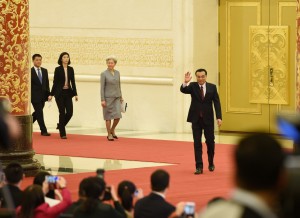
[10:21] ![]() Xiaorong007@weibo.com:
Xiaorong007@weibo.com:
NPC deputies and CPPCC members gather together during the “two sessions” to discuss the 13th Five-year Plan, vowing to improve the people’s livelihood.
[10:18] China’s national lawmakers on Wednesday approved the charity law with 2,636 affirmative votes, 92.49 percent of the total.
[10:14] Chinese journalists pay more attention to simplifying administration, delegating power, carrying out reform, and improving people’s livelihood, whereas journalists from international media outlets are more interested in China’s economic development in the future and the 13th Five-Year Plan (2016-20).
[10:08] More than 1,000 journalists are estimated to attend Premier Li’s press conference after the NPC annual session concludes.
[10:04] The press conference to be given by Premier Li Keqiang will begin at about 10:30 a.m. (02:30 GMT) today.
[10:00] The premier’s press conference, which follows the NPC closing ceremony each year, started in 1991, when Premier Li Peng accepted the invitation from Zhou Jue, spokesperson for the Fourth Session of the Seventh NPC, to meet the press. In the press conference, media from Hong Kong, Macao, Taiwan, and international agencies were granted with one question each.
[09:49] The Great Hall of the People in Beijing is filled to capacity with journalists vying to raise questions to Chinese Premier Li Keqiang in a media war.
[09:45] Zhang Dejiang announced the conclusion of the fourth session of the 12th National People’s Congress (NPC).
[09:40] ![]() @Sina Weibo “Tudouxiaomengjun”:
@Sina Weibo “Tudouxiaomengjun”:
The vision of completing the process of building a moderately prosperous society in all aspects is so inspiring and beautiful! The will of the people is powerful!
[09:39] Zhang Dejiang, chairman of the Standing Committee of the National People’s Congress (NPC), is delivering a speech at the NPC closing meeting.
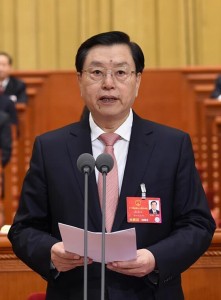
[09:38] The National People’s Congress, China’s top legislative body, on Wednesday approved the work report of the Supreme People’s Procuratorate at the closing meeting of the legislature’s annual session.
[09:33] The National People’s Congress, China’s top legislative body, on Wednesday adopted the work report of the Supreme People’s Court at the closing meeting of the legislature’s annual session.
[09:29] The Fourth Session of the 12th National People’s Congress (NPC) on Wednesday adopted a resolution to approve the report on the implementation of central and local budgets for 2015 and on draft central and local budgets for 2016.
[09:28] The National People’s Congress (NPC), China’s top legislative body, on Wednesday adopted the work report of the NPC Standing Committee at the closing meeting of the legislature’s annual session.
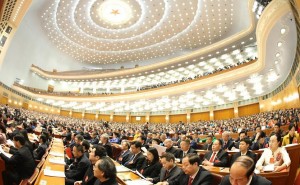
[09:25] The National People’s Congress, China’s top legislative body, adopted a resolution to approve the government work report Wednesday at the closing meeting of the legislature’s annual session.
[09:24] China’s national lawmakers on Wednesday voted for the charity law at the closing meeting of the annual parliamentary session.

[09:23] ![]() @Sina Weibo “JianghonghongLcy”:
@Sina Weibo “JianghonghongLcy”:
As the annual big political event, the “two sessions” embody the ardent hope of Chinese people and work as important channels for communication between the government and the people. The proposals raised by the NPC deputies and CPPCC members covered all aspects of our daily life and laid a foundation for the growth of living standards. We should pay more attention to political affairs, follow the “two sessions” with interest and view this political event in the light of development.
[09:18] Chinese lawmakers on Wednesday approved the country’s economic and social development blueprint for the 2016-2020 period, which sets targeted average annual economic growth of above 6.5 percent in the next five years.
[09:17] Zhang Dejiang, chairman of the NPC Standing Committee, presided over the meeting.
[09:16] The National People’s Congress, China’s top legislature, is holding the closing meeting of its annual session.
[08:41] ![]() @Sina Weibo “Lu Xixin”:
@Sina Weibo “Lu Xixin”:
Developing the national economy stage by stage is China’s characteristic and advantage. To realize these beautiful concepts and magnificent goals, we should perform practical work and pay attention to details. Moreover, we need to care about the fairness and justice of development, narrowing the income gap and heading down the real socialist road to common prosperity.
[March 16, 08:23] The closing meeting of the fourth session of the 12th National People’s Congress (NPC) will be convened at the Great Hall of the People in Beijing at 9 a.m.
————————————————–————————————————–
[20:25] Commercial use in space industry is a huge market. In the United States, commercial satellites account for more than a half of the satellites in orbit. China, however, has yet to secure a sizable space for itself in the market.
[18:51] China will establish a commercial rocket development and launch company, according to Hu Shengyun, chief model designer of China Sanjiang Space Group (CSSG). He said that Kuaizhou-11, the company’s latest carrier rocket, is scheduled to conduct a commercial launch in 2017.
[18:05] ![]() David Chow Kam Fai, a CPPCC member and voting member of the Macao SAR Chief Executive Election:
David Chow Kam Fai, a CPPCC member and voting member of the Macao SAR Chief Executive Election:
The draft of the 13th Five-Year Plan mentions that China will support medium, small and micro-sized businesses in Hong Kong and Macao, and welcome people in the two places to start up new businesses in the Mainland. I believe the more than 15,000 small businesses in Macao will benefit more from FTZ development, financial and taxation reforms, and the Guangdong-Hong Kong-Macao Aerial Hub, among other major projects.
[16:56] China’s 13th Five-Year Plan (2016-2020), which experts see critical in tiding the country through a transition period, will create more opportunities for sustainable growth within and beyond its borders.
[16:51] ![]() Media commentator Liu Hui@ Weibo.com:
Media commentator Liu Hui@ Weibo.com:
Huang Qifan, the mayor of Chongqing Municipality, pointed out that if we do not interfere in the operation of some local governments to leverage the real estate market with high prices, it will eventually result in a devastating crisis. I couldn’t agree more with the mayor as some local governmental officials are myopic in adopting stimulus policies to assist property brokers by inducing the public to purchase houses. If they continue to do so, the subprime mortgage crisis is unlikely to be avoided.
[16:39] China’s residential property market is unlike the housing bubble experienced by Japan in the 1980s, Minister of Housing and Urban-Rural Development Chen Zhenggao said at a press conference on rebuilding shantytowns and real estate development on the sidelines of the fourth session of the 12th National People’s Congress in Beijing Tuesday.
![Minister of Housing and Urban-Rural Development Chen Zhenggao answers questions at a press conference on rebuilding shantytowns and real estate development on the sidelines of the fourth session of the 12th National People's Congress in Beijing, capital of China, March 15, 2016. [Photo/China.org.cn]](http://live.china.org.cn/wp-content/uploads/2016/03/1111-300x215.jpg)
![]() Liu Xiaomi@weibo.com:
Liu Xiaomi@weibo.com:
NPC deputies and CPPCC members should reflect on social affairs based on public opinion. There should be more social and scientific researchers, teachers, workers, and PLA soldiers getting involved.
[15:03] China’s State Council, the cabinet, has issued an action plan to improve its citizens’ scientific literacy over the 13th Five-Year Plan period (2016-2020).
[14:37] Many motions introduced in annual legislative session resulted from grassroots research, NPC department says.
[13:15] ![]() @Sina Weibo “Wuhanligongtujianmaya”:
@Sina Weibo “Wuhanligongtujianmaya”:
The year of 2016 is the first year of the 13th Five-Year Plan. Whether or not China will realize its first goal to complete the process of building a moderately prosperous society in all aspects will depend on this year’s performance. Therefore, this year’s “two sessions,” during which China’s development directions are decided, are extremely important.
[11:58] ![]() Infographic: 2016 Government Work Report
Infographic: 2016 Government Work Report
[11:48] More ministers also seemed willing to meet with the media on the approach path to the Great Hall of the People this year.
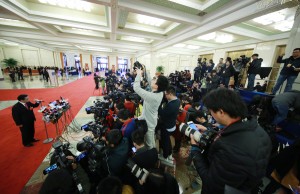
[11:11] Breakthroughs included Foreign Minister Wang Yi’s news conference on March 8 – his longest since taking office, with 19 questions fielded over 2 hours – and the record 19 news conferences arranged on the sidelines, with guests such as newly-appointed China Securities Regulatory Commission Chairman Liu Shiyu.

[11:09] A wide spectrum of observers, from journalists to ordinary citizens, have commented on the unprecedented access granted at this year’s two sessions of China’s national advisory body and legislature.
[10:55] ![]() China’s political advisors think the upcoming charity law is a historic landmark that will help regulate this important area which relates to everyone.
China’s political advisors think the upcoming charity law is a historic landmark that will help regulate this important area which relates to everyone.
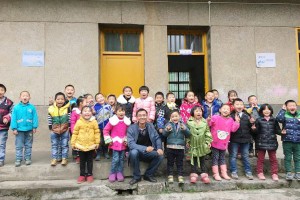
[10:51] ![]() The sunshine generation of post 1990s@ Weibo.com:
The sunshine generation of post 1990s@ Weibo.com:
[Views from Nannong people on the “two sessions”]: To pay attention to the ongoing “two sessions” is an important path for university students to participate in the political life. As a local from Nannong, we we have been focusing on the “two sessions” because we’re aspiring to contribute to the political construction of our country.
[10:49] Chinese top political advisor Yu Zhengsheng told more than 2,000 fellow advisors,
China is at a decisive stage in the journey toward building a moderately prosperous society in all respects by 2020. The curtains of history have been lifted and the arduous tasks have been bestowed on our shoulders.
[10:47] The fourth session of the 12th National Committee of the Chinese People’s Political Consultative Conference (CPPCC), the country’s top political advisory body, concluded on March 14 in Beijing.
[10:42] Highlights of work reports from SPC and SPP
- Intensify legal mechanism to prevent miscarriages in justice
- Protections and reward for reporting duty crimes
- Eye on corruption at grassroots levels, especially cases related to agriculture, rural areas and farmers
- Severe punishment on extreme violence
- Improve executive ability
- Build information-based judicial process
- Prevent abuse of power
- Fight against financial crimes
- Criminals in illegal fundraising to be punished
- Clearing the backlog of unexecuted punishments
- Punish bribery in elections
- Targeting crimes of damaging environmental resources
- Few sentences differentiated to similar cases
- Improper intervention with judicial process to be stopped
- The working environment of judges to be improved
[10:40] Twenty-two high-ranking officials stood trial last year as part of the nationwide anti-graft campaign, with another 41 placed under investigation, up by 46 percent on 2014, according to the Supreme People’s Procuratorate.
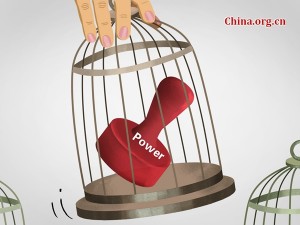
[10:34] China’s two top judicial bodies, the Supreme People’s Court and the Supreme People’s Procuratorate, delivered their work reports to the National People’s Congress on March 13, 2016.
[09:59] The draft will be submitted to lawmakers for a vote on March 16.
[09:45] ![]() Infographic: Highlights of proposals for China’s 13th Five-Year Plan
Infographic: Highlights of proposals for China’s 13th Five-Year Plan
[09:44] Earlier this month, China unveiled a draft outline of the 13th Five-Year Plan on national economy and social development, which set average annual GDP growth target at above 6.5 percent from 2016 to 2020.
[09:42] ![]() @Sina Weibo “Modest bacon” : I followed this year’s two sessions with great interest and hope to know more about China’s development. The NPC deputies and CPPCC members have raised lots of proposals from social reality and public interest during the two sessions. Many of the proposals have voiced public concern and criticized social evils and provided good methods for improvement. Chinese democracy has shown its advantages to the world.
@Sina Weibo “Modest bacon” : I followed this year’s two sessions with great interest and hope to know more about China’s development. The NPC deputies and CPPCC members have raised lots of proposals from social reality and public interest during the two sessions. Many of the proposals have voiced public concern and criticized social evils and provided good methods for improvement. Chinese democracy has shown its advantages to the world.
[09:40] People from various walks of life and the world media have kept a close eye on and highly praised the government work report delivered by Chinese Premier Li Keqiang.
[09:33]  Webcast in review: Li delivers gov’t work report
Webcast in review: Li delivers gov’t work report
[09:31] At the opening meeting of the fourth session of the 12th National People’s Congress(NPC) on March 5, Premier Li Keqiang delivered the government work report to nearly 3,000 legislators in the Great Hall of the People.
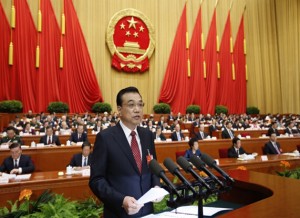
[09:30] Chinese Premier Li Keqiang will host a press conference immediately after this year’s NPC session concludes.
[March 15, 09:29] The fourth session of the 12th National People’s Congress (NPC), China’s top legislature, will hold its closing meeting on March 16, according to the agenda.


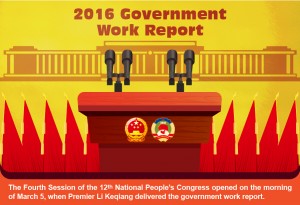

China is developing steadily, paying much greater attention to growth quality, environmental protection and people’s livelihood. The country will become stronger and stronger. I love my motherland.
A perfect webcast. Tough year for the world economies. China really matters and hopefully everyone can benefit from the peaceful rise of China.
It is optimistic to get the knowledge from the vigorous reponses of Premier Li who pledged that China will maintain its peaceful and sustainable developmetn in spite of the sluggish economies affecting the world as a whole.
It’s true China’s economic development is increasingly important to the world.
China is making great efforts to boost its economic restructuring and industrial upgrading. Premier Li gives us more confidence at the press conference and I believe China will have a bright future.
Hopefully, Chinese gov’t’s policies can drive the economy and benefit the whole world.
Indeed, the common interests between China, US are bigger than differences.